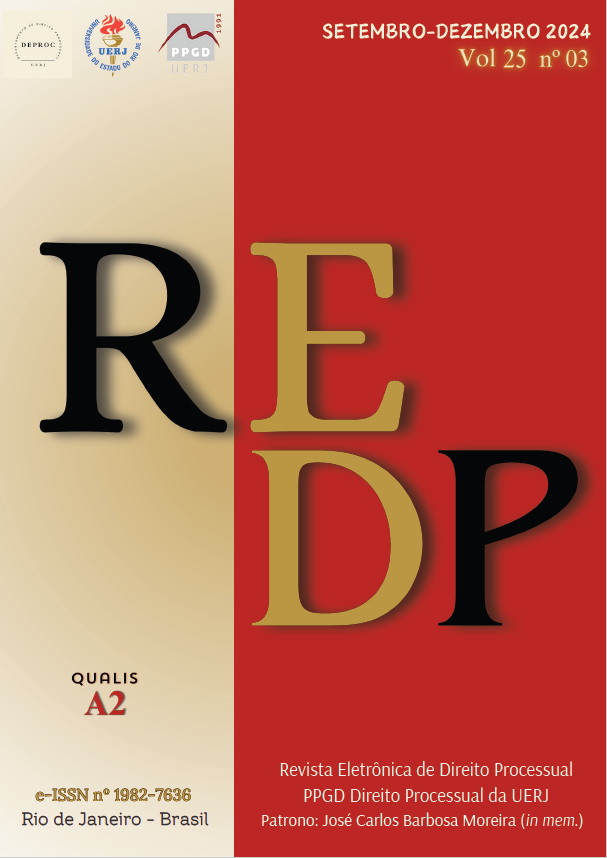COMENTÁRIOS SOBRE O JULGAMENTO COLEGIADO ESTENDIDO DO ARTIGO 942 DO CPC
DOI:
https://doi.org/10.12957/redp.2024.86593Resumo
Este artigo objetiva tecer considerações acerca da técnica de julgamento inserida no artigo 942 do Código de Processo Civil de 2015 em substituição ao recurso de Embargos Infringentes então previsto no Código de Processo Civil de 1973. Examina-se como era a previsão no Código anterior, bem como as discussões havidas no processo legislativo sobre os julgamentos não unânimes até se chegar à previsão aprovada pelo Congresso Nacional. Utilizando o método dedutivo com revisão legislativa e jurisprudencial e pesquisa bibliográfica como opção metodológica, o artigo analisa a técnica do artigo 942 do CPC/2015 com detalhes e com notas sobre os entendimentos já exarados pelo Superior Tribunal de Justiça. Por fim, ponderam-se as soluções que foram dadas a críticas que eram feitas aos Embargos Infringentes e os problemas que remanescem na atual técnica de julgamento. Conclui-se, de um lado, que a técnica foi criada pelo propósito de levar o desacordo a sério, fomentando a deliberação entre os julgadores em decorrência da existência de um voto divergente e, de outro, que não se resolve a crítica da demora de se finalizar o julgamento no tribunal de segunda instância.
Downloads
Publicado
Como Citar
Edição
Seção
Licença
Copyright (c) 2024 André Garcia Leão Reis Valadares

Este trabalho está licenciado sob uma licença Creative Commons Attribution 4.0 International License.
Todos os artigos publicados na Revista Eletrônica de Direito Processual (REDP) (Departamento de Direito Processual, Universidade do Estado do Rio de Janeiro, Brasil) são licenciados por meio de uma Licença Creative Commons - Atribuição 4.0 Internacional (CC BY 4.0).
Os autores retêm os direitos autorais de seu artigo e concordam em licenciar seu trabalho com a licença CC BY 4.0, aceitando assim os termos e condições específicos desta licença disponíveis no seguinte website: https://creativecommons.org/licenses/by/4.0/legalcode.
- Os autores concedem à REDP o direito de primeira publicação, de se identificar como publicadora original do trabalho e concedem à revista uma licença de direitos não exclusivos para utilizar o trabalho das seguintes formas: Reproduzir, vender e distribuir cópias eletrônicas ou impressas do manuscrito como um todo, de partes específicas do manuscrito e de suas traduções para qualquer idioma;
- O uso do artigo por terceiros é livre, contanto que a integridade da publicação seja mantida e seus autores originais, periódico de primeira publicação e detalhes de citação sejam identificados.
Dentro dos termos da licença, os autores podem entrar em acordos contratuais adicionais separados para a distribuição não exclusiva da versão publicada do trabalho na revista.
Copyright and Licensing
All articles published in the Procedural Law Electronic Review (REDP) (Department of Procedural Law, State University of Rio de Janeiro, Brazil) are licensed under a Creative Commons License - Attribution 4.0 International (CC BY 4.0).
- Authors retain copyright to their article and agree to license their work under the CC BY 4.0 license, thereby accepting the specific terms and conditions of this license available at the following website: https://creativecommons.org/licenses/by/4.0/ legal code.
- Authors grant REDP the right of first publication, to identify itself as the original publisher of the work, and grant the journal a non-exclusive license to use the work in the following ways: Reproduce, sell and distribute electronic or printed copies of the manuscript as a whole, of specific parts of the manuscript and its translations into any language;
- Use of the article by third parties is free, as long as the integrity of the publication is maintained and its original authors, first publication journal, and citation details are identified.
Within the terms of the license, authors may enter into separate additional contractual agreements for the non-exclusive distribution of the published version of the work in the journal.




